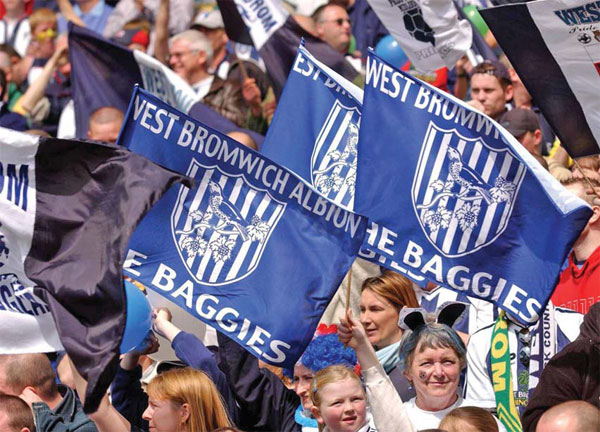Looking to score big in a risky business
Updated: 2016-08-12 07:54
By Angus NcNeice in London(China Daily Europe)
|
|||||||||
While English Premier League has become more profitable, many large European clubs still hemorrhage money
Chinese companies have invested in European football at a startling rate over the past 18 months, snapping up clubs across countries and divisions, prompting fans and industry players to wonder, "Why now? And how do the Chinese plan on succeeding in the volatile world of football investment?"
At the start of last year, no Chinese company had money invested in an elite European club. Today, they own stakes in four.
|
West Bromwich Albion fans in a carnival spirit during a Premiership match. Provided to China Daily |
Wang Jianlin, chairman of Wanda Group, bought a 20 percent stake in Atletico Madrid in January last year, then China Media Capital bought a 13 percent stake in Manchester City, then Suning picked up Inter Milan. On Aug 5, a Chinese conglomerate also took control of AC Milan.
"One of the most notable developments in global football in the past 12 months has been a marked increase in the level of interest of Chinese stakeholders in the game," says Richard Battle, senior manager of Deloitte's Sports Business Group.
While President Xi Jinping's policy drive to make China a football powerhouse has spurred investment, the sport has also become increasingly attractive to buyers. The threat of sanctions under UEFA's financial fair play regulations and ballooning TV rights deals have made clubs both more responsible and more profitable.
In the 2012-13 season, only half of the English Premier League's 20 clubs made an operating profit. The next year, it was 17, according to Deloitte.
In England, thanks to a record 5.14 billion pound ($6.6 billion; 6 billion euros) television rights deal, each Premier League club will now make 170 million pounds over three years. The recent depreciation of the pound - a result of the Brexit referendum - is also likely to have contributed to intense interest in British clubs this summer.
Yet football clubs remain risky investments, as many large European clubs continue to hemorrhage money.
AC Milan has a strong international brand, but last year it reported a loss of about 94 million euros ($104 million). The sale included an estimated 220 million euros of debt.
Kathya Santos, CEO of Guanxi Global, which brokers investment deals between Chinese corporations and European clubs, says Chinese buyers with other large commercial interests are interested in leveraging club brands to reach more consumers, as well as to generate revenue directly.
"They may already be in real estate or online retail, and it's about attracting a new audience to your other products," she says. "If you can attract an audience with what's happening with the football club, you can increase sales elsewhere in your business."
In addition to internationally known teams, Chinese investors have targeted top-flight clubs with moderate profiles - La Liga side Espanyol is owned by Rastar Group, and also in this month a Shanghai company purchased a controlling stake in Premier League side West Bromwich Albion.
Money has even seeped down into the lower divisions. This summer, English second-tier clubs Aston Villa and Wolverhampton Wanderers were both taken over by Chinese buyers.
Santos says purchasing lower-tier clubs can be a shrewd move, as promotion can provide a significant return on an investment. Of course, such purchases are also a gamble, and Santos says there are a number of areas her company looks at when advising Chinese investors.
"We look at (the club's) history, their sponsorship contracts, their squad, the cost of running the club, employee contracts," she says. "Do they own the stadium? Do they own the fields they are training on or are they rented? We look at the management that is in place, from a business side and a sporting side. Sometimes the club is performing really well, but it's in debt.
"What I've learned is that Chinese people really don't like to make mistakes. They are more risk averse than most," she adds. "They double-check everything and are big negotiators."
Above all, Santos says she tries to fire home the need to install strong management when advising Chinese investors.
"I stress the importance of good management from a business perspective, as well as football performance, to secure the viability of a football club as a healthy business," she says. "Investors are always looking to diversify their portfolio and their main objective, of course, is to increase their wealth through any investment they make. Football is no exception."
angus@mail.chinadailyuk.com
(China Daily European Weekly 08/12/2016 page7)
Today's Top News
Chinese investment in European football
Myanmar's Suu Kyi to visit Beijing
Ukraine denies attempted troop invasion of Crimea
Solidarity called to firefighters facing wildfires
Eurostar train staff to strike for seven days: UK union
Trump's gun rights comments ignite firestorm
China consumer prices up 1.8% in July
Video introduces G20 city Hangzhou to Europe
Hot Topics
Lunar probe , China growth forecasts, Emission rules get tougher, China seen through 'colored lens', International board,
Editor's Picks

|

|

|

|

|

|








